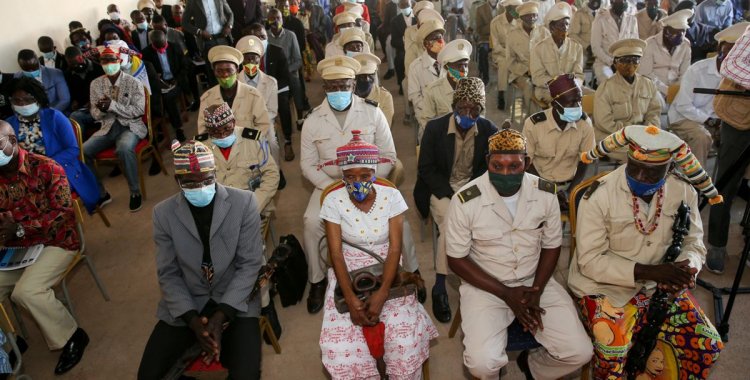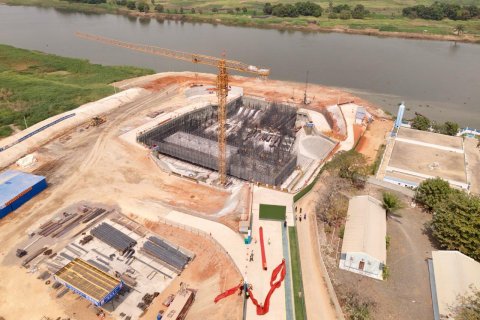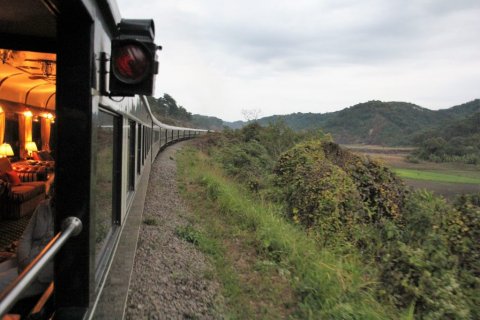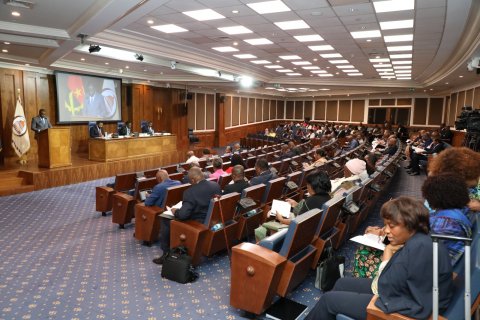"We are here to ensure that the diamonds also shine for us," Wa Tembo said during the days on citizenship and security being held this Tuesday and Wednesday in Cafunfo, a mining town in Lunda Norte, where on January 30 several people died in incidents with the police.
The king, who called for this wealth to be built also through dialogue, stressed the pride of "being Angolan," but questioned the benefits of diamonds for the population.
"One of these days they found a diamond of more than one hundred carats in the Lulo mine [in the Lucapa mining complex, known for its rare and high quality diamonds]. What benefit do these discoveries bring to the population? A population that lives in misery and from misery," he questioned.
Muatchissengue Wa Tembo was speaking before the audience gathered in the April 4 hall to discuss solutions to the violence, which was attended by civil society, local and church authorities, sobas and regents, police officials and human rights defenders.
In the conclusion of the king of the Lundas, the diamond industry has not resulted in benefits, but in the destruction of the mines, detour of rivers, permanent destruction and punishment.
"The profit is theirs, the suffering is ours," he stressed.
However, he said he is not in favor of "a change by brute force," but through dialogue "so that the wealth is accessible to the entire population," calling for a new model for local development based on education and listening to local communities.
Wa Tembo called for the creation of a sustainable development council for the Lundas with the participation of state and traditional authorities, as well as diamond-related companies.
He also presented several proposals, including the rehabilitation and construction of roads, the Angolanization of cadres in mining companies "where workers are subjected to people who are strangers" to the local culture, and that mining companies make good on their promises of social responsibility.
"Right now, in Cuango [where Sociedade Mineira do Cuango operates], there is nothing in favor of the communities," he lamented.
Representatives of Endiama and Fundação Brilhante, the social arm of the state-owned diamond company were also present at the meeting, affirming their commitment to social responsibility and local development.
However, despite the announcement of a cooperation agreement between the Sociedade Mineira do Cuango (SMC) and the Fundação Brilhante for a program of sustainable development of the mining areas, as well as the reaffirmation of the promise to transfer the Fundação Brilhante headquarters from Luanda to Dundo, in Lunda Norte, "to be closer to the population and its problems," they failed to convince those present.
On the contrary, besides some apupos to the speakers, the civil society and local authorities showed their dissatisfaction with the non-fulfillment of promises.
The mayor of Ngonga Ngola accused the SMC of not getting along with the sobas and spoiling the lagoons that supply the population, complaining that the agreements stipulated with the traditional authorities are not being fulfilled.
"We want the government to solve our problems without falling for the lies of the Cuango mine company, which has failed to deliver on its promises. If it continues with its arrogance, we as a people will act in our own way because it has exhausted our patience," he warned.
A young man lamented that SMC is interdicting the passage on the "generals' road", which crosses the mining concession and offering no alternatives to the people.
"Where is the social area of the Cuango mine going?" he questioned, receiving negative responses from the audience attending the debate.
The conference on Citizenship and Public Safety, organized by Ufolo - Center for Studies for Good Governance, in partnership with the General Command of the National Province, will continue on Wednesday with a panel where testimonies of local religious leaders, participants and witnesses of the event and family members of the victims will be heard.
On January 30, according to the police, about 300 people linked to the Movement of the Portuguese Protectorate Lunda Tchokwe (MPPLT), which for years has defended the autonomy of that region, tried to invade a police station, forcing the forces of order to defend themselves, causing six deaths.
The police version is contradicted by the leaders of the MPPLT, political parties in opposition and local civil society, which speak of more than 20 deaths and claim that it was an attempt to demonstrate, previously communicated to the authorities, and that the demonstrators were unarmed.
The MPPLT is fighting for the autonomy of the Lundas region, in the east-north of the country.
The autonomy of the Lundas region (Lunda Norte and Lunda Sul, in eastern Angola), rich in diamonds, is claimed by this movement, which is based on a Protectorate Agreement signed between Lunda-Tchokwe natives and Portugal in 1885 and 1894, which would give the territory an internationally recognized status.
Portugal allegedly ignored the kingdom's status when it negotiated Angola's independence between 1974/1975 only with the liberation movements, according to the movement.







